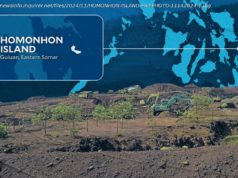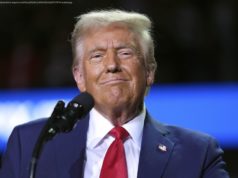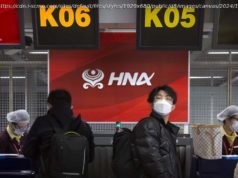Joey Siu, an activist featured in the Oscar-nominated documentary, talks about the protests and China’s national security crackdown.
Hong Kong transformed in a year. Starting in June 2019, the city convulsed with protests over a controversial extradition bill. That expanded into a pro-democracy movement that sought to push back against China’s efforts to further erode the city-state’s already tenuous autonomy, and the freedoms that went with it. By June 2020, the power of those uprisings brought China’s full might down on Hong Kong, as Beijing implemented a draconian national security law that stifled dissent — or anything that looked even remotely like it in the eyes of the Chinese Communist Party. Do Not Split, an Oscar-nominated short documentary by filmmaker Anders Hammer, charts some of Hong Kong’s most tumultuous months of the pro-democracy uprising and its troubling, unclear end in the face of China’s crackdown. The story is told by the protesters and activists on the front lines, the young people who are trying to protect the freedoms of Hong Kong — freedoms that were supposed to be guaranteed until 2047 under the “one country, two systems” arrangement China agreed to when it took back control of Hong Kong from Britain in 1997 — for as long as they can. Even it’s a battle they know they are losing. “It was very difficult to understand how this would work. How could this small group of young people fight China?” journalist and filmmaker Anders Hammer, the director of Do Not Split, told me. “At the same time, it was really something unique to watch how they work together. You could really sense that solidarity among the protesters, and a great deal of sacrifice and this communion feeling in the street.” Do Not Split follows demonstrators to the edges of the protests: where they regrouped to recover from tear gas, where they camped out in a field after a clash with police at the City University of Hong Kong in November 2019. The film also reveals just how explosive these protests became; frame after frame shows the escalation, from protesters shielding themselves with umbrellas from assaults of tear gas to protesters flinging firebombs at lines of police. (The full documentary is now available from Field of Vision.) The Hong Kong protests were largely leaderless and anonymous, but the documentary follows a few characters closely, including Joey Siu, a student activist who, in the film, always seems to be hovering around the latest protest, observing and explaining what she’s witnessing, reckoning with what’s happening in Hong Kong in real time. Siu, who is also a US citizen, decided to use her position as a student activist to try to lobby lawmakers abroad and bring attention to Hong Kong’s pro-democracy struggle, actions that became even riskier under the national security law. This fall, she made the decision to come to the United States and continue fighting for Hong Kong from America. “It is always a struggle between staying and suffering with the others, or to leave and suffer on your own but to be able to do something. I made the choice,” Siu told me. I called Siu to talk more about her experiences during the Hong Kong protests; how they have left her generation traumatized; and how the national security law has stifled the city she loves but is not giving up on yet. Our conversation, edited and condensed, follows. How did you first get involved in the extradition bill protests? It was, I would say, an accident. Every university in Hong Kong, we’ve got a student union, which represents the students and participates in all kinds of negotiations with the school and fights for the welfare of the students. Right before the extradition bill movement broke out in Hong Kong, there was no one standing for the student union executive committee elections at my school. Then one of my friends said he was willing to be nominated as the acting president, and he asked, “Hey, Joey, are you willing to be the vice president?” I was pretty surprised when he approached me, because I never expected myself to be taking up the role. I actually rejected him several times. I said, “No, I don’t feel like I can be good at this. I don’t feel like I’m a good choice for you.” But he insisted. So he convinced me, and I agreed to that. I was nominated by the Student Union Council right before the first protests on the 9th of June 2019, when the whole extradition bill movement broke out. Then, when the movement broke out in Hong Kong, we realized that, as student leaders, we had the responsibility and the capacity to stand out and to do something. Alongside other university student unions, we had been organizing and encouraging people to participate in protests. We had been helping to allocate resources like safety goggles, gloves, and other protective gear. That was how I started my activism. And then very soon, in July 2019, we realized that it is actually a leaderless movement, where we no longer need student leaders, we no longer need politicians, to guide us. We felt like, “Well, what can we do if we are no longer needed to organize protests and assemblies?” And at that time, we found that the United States Congress was about to discuss the Hong Kong Human Rights and Democracy Act. We felt like, as student leaders or as ordinary Hong Kong students, we might be able to provide a unique perspective on what was going on in Hong Kong and why it was so important for the international community to do something to help. Since then, I have been more active in terms of international advocacy for Hong Kong. I had been flying around to different countries during 2019 — US to Canada, Germany, Brussels, the UK — to advocate for international solidarity with Hong Kong. You said you got into it sort of by accident, but obviously you ended up being fully committed. What motivated you to do that? Personally, I have always been very candid on social issues, especially Hong Kong politics. I have always paid very close attention to what is going on in Hong Kong, locally and also internationally. That is the fundamental reason why I felt like I should be doing something for the people I care about and for the place I love. So getting involved in international advocacy for Hong Kong, I felt like that might be the thing that I could do the best for Hong Kong. We all have different roles. Some of us are front-line protesters. Some of us are voluntary first-aid providers. Some of us are citizen journalists. Every Hongkonger who loves the city, who believes in those values, is trying to find a way to devote ourselves. So I would say this is how I contribute. This is how I devote myself to defend the values that I care for. Did you continue participating in the protests on the front lines? I had been starting to go on international advocacy visits ever since September 2019. However, during the time when I was still in Hong Kong, or where I came back to Hong Kong, there were still protests and assemblies, and I would still go to them because I felt like, as I have said, everyone is trying to do our best to devote to the city. You mentioned that you took your first international trip in September 2019. That feels like a really pivotal time for the movement. In early September, Hong Kong Chief Executive Carrie Lam rescinded the extradition bill, but the protests continued, and the world was really paying attention by that point. How did that affect your activism abroad? Well, at the very beginning, of course, we were protesting to take the extradition bill amendment down and to stop the Hong Kong government from again violating the will of the people. However, I think it was in late July 2019 — especially after the Yuen Long attack [Ed. note: A mob, believed to have ties to organized crime, violently attacked protesters] — when I think a lot of Hong Kong people realized and awakened to the unlimited power of the Hong Kong government and also the Chinese government. From my personal experience, at the very beginning, we had been putting a lot of focus on telling people what the extradition bill amendment was about and why it was so important for us to take it down. However, as we have realized that we are actually protesting against the Chinese communist regime, we have been shifting our focus in terms of telling people why we are doing that. Why it is so important for all of us to stand in solidarity in terms of containing the rise of the regime in Beijing. Why we have to pay attention to Hong Kong. In the film Do Not Split, you say you had hoped to be a teacher, but you don’t believe it can be a path for you anymore because of your outspokenness. When did you realize that your activism in Hong Kong also meant a change in your future, and your identity? Well, I mean, I have always known that I want to be a person who could bring change to society.
Start
United States
USA — China A pro-democracy activist on Hong Kong’s year of turmoil: “The city itself...






